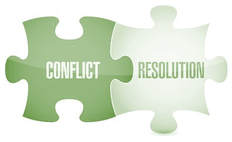|
Conflict is inevitable. It is impossible to agree with everyone all of the time about everything. But that doesn’t make the animosity or anger that arises as a result any more bearable. Conflict prevents us from making decisions, communicating effectively and being empathetic towards another person’s perspective.  Conflict is not a contest—don’t make it one. However, it is possible to resolve conflict quickly calmly and effectively. Understanding Conflict Conflict arises whenever two or more people disagree about their ideas, desires or values. While these differences can range from trivial to fundamental disagreements, they all stir up strong emotional feelings. However, conflict is more than just an emotional reaction, it is a physiological response. You have two amygdala – one on each side of the brain behind the eyes and the optical nerves. When a threat is perceived, your amygdala send signals to your brain to release adrenaline and cortisol into your system. These hormones gear your body up for ‘fight’ or ‘flight’. You may notice immediate physical changes such as increased heart rate and sweaty palms. Because the active amygdala shut down the neural pathway to your prefrontal cortex, you become disorientated in heated conversations. These responses are designed to avoid danger; however, they also prevent you from making complex decisions or seeing things from another person’s perspective. Remember the four principal approaches to conflict:
Calm your brain during conflict. In Part 2 we will look at how you can keep your cool when faced with conflict and provide some mindful approaches to use when you find yourself on the cusp of conflict. The Myers-Briggs Type Indicator (MBTI) can assist to improve communications and conflict resolution. Understanding your own personality and that of other people who you work with can provide great insight into how conflict situations arise and how they can be dealt with constructively. It enables people to quickly recognise their default conflict handling style and learn how to adapt to different types of conflict. Using the MBTI can help achieve positive results from conflict, such as better decisions and more creative thinking. Get in touch now to see how you can use the MBTI instrument to understand your own personality and/or that of your team.
0 Comments
Leave a Reply. |

